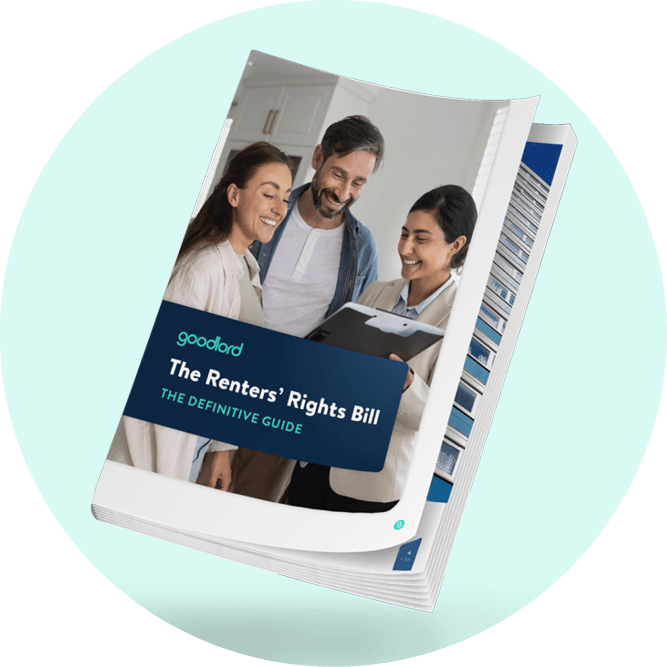22 expert quotes about the future of the Private Rented Sector
Key players in the PRS discussed the Renters' Rights Bill and other existential issues facing the industry at the Haymarket Hotel on January 22.
Earlier this week, Goodlord gathered industry leaders, top lawyers, letting agents, MPs, Peers, and councillors together to discuss the future of the Private Rented Sector (PRS).
Our CEO, William Reeve, led the discussion and was joined by:
- Lord Best OBE, DL - Cross-bench peer
- Ben Beadle - Chief Executive, NRLA
- Nathan Emerson - CEO, Propertymark
- Ian Fletcher - Director of Policy, British Property Federation
Panellists tackled a wide range of issues, including how the Renters' Rights Bill is likely to progress, ongoing issues with supply and demand, and the need for a coherent strategy for the sector.
Key takeaways: The Renters' Rights Bill and Beyond - Building a long-term vision for the future of the PRS
Use the menu below to navigate through the key takeaways, or keep scrolling 👇
- 1 - Some amendments to the Renters' Rights Bill are likelier than others
- 2 - The Decent Homes Standard will raise the bar for tenants and landlords
- 3 - Supply and demand issues will be exacerbated
- 4 - Loopholes in the tribunal process will prove costly for landlords
- 5 - Small landlords will be hit hardest
- 6 - There are still opportunities to improve landlord and tenant experiences
- 7 - The PRS is in desperate need of a coherent strategy
1 - Some amendments to the Bill are likelier than others
Lord Best opened the session with an update on the legislative journey of the Renters’ Rights Bill. He said:
"The Bill has whistled through the House of Commons—no votes in committee, which is quite unusual—and now it comes to the House of Lords. We had the second reading on February 4th, and the committee stage will likely take three days, starting about a week later. After that, it will go to the report stage for voting on amendments. Will this all be done before Easter? No, but not long thereafter, I think."
On the likelihood of major changes to the Bill, he added:
"The Government won’t budge on abolishing fixed-term tenancies, but there might be room for concessions on student lettings. Fixed terms make sense in that context, and it’s an area where we may see flexibility."
Referring to the amendments the Government recently announced, William Reeve said:
"The inability to request larger upfront payments, even for tenants without a credit history, might make landlords more selective. Vulnerable renters, including international students and self-employed individuals, could find it harder to secure housing."
2 - The Decent Homes Standard will raise the bar for tenants and landlords
Ian Fletcher, Director of Policy at the British Property Federation, highlighted the potential of the Decent Homes Standard to uplift the sector:
"The Decent Homes Standard is a step in the right direction. It has the potential to elevate housing quality across the sector, ensuring tenants have homes that meet basic safety and living conditions."
Ben Beadle emphasised landlords’ shared commitment to housing quality, supporting the introduction of this measure:
"We all want tenants to live in good conditions, and the Decent Homes Standard sets an important baseline. It’s something landlords who already provide quality housing can support as it raises the bar for the wider market."
3 - Supply and demand issues will be exacerbated
Throughout the discussion, the panel referred to the acute shortage of rental properties. Lord Best said:
"If we see a 2% annual decline in the PRS over the next 10 years, that’s a million properties moving out of the sector. Around half might go to first-time buyers, which is positive, but the other half might leave the housing market entirely or go to short-term lets, which won’t help tenants looking for stable, long-term homes."
Ben Beadle added:
"The private rented sector is already overstretched, with 21 people applying for every available property. Losing small landlords who provide much of the housing stock will only exacerbate this crisis, leaving vulnerable renters with fewer options."
Nathan Emerson expressed disappointment about successive governments lacking the political will to address the housing crisis:
"What we’re dealing with is the symptoms, not the cause. If we had 25% more housing stock of mixed tenure today, we wouldn’t be having this problem. Instead, we’re focusing on containing what we already have rather than finding a solution to grow the supply."
Ian Fletcher also highlighted challenges around development that are likely to further slow progress:
"I don’t think most people understand how difficult it is to develop in the current climate. Development conditions are probably the worst they’ve been in 15 years, with the cost of building a house rising 40% in just five years."
 Shadow Secretary of State for Levelling Up, Housing and Communities, Kevin Hollinrake MP, poses a question to the panel.
Shadow Secretary of State for Levelling Up, Housing and Communities, Kevin Hollinrake MP, poses a question to the panel.
4 - Loopholes in the tribunal process will prove costly for landlords
The proposed reliance on tribunals to settle disputes, including rent increases, was widely debated. Nicola Thivessen, Director of Group Compliance at Kinleigh Folkard & Hayward, said:
"The concern I’ve heard expressed around the tribunal process is that if the tribunal eventually finds in the landlord’s favour—let’s say it takes six months—it will only take effect from the tribunal date. So there’s quite a strong incentive for tenants to appeal, as they potentially get six months of lower rent as a result."
Lord Best proposed what he believed to be a better solution around rent increases:
"Tribunals may become bottlenecks, delaying justice for both landlords and tenants. A more streamlined system, perhaps tied to inflation rates for in-tenancy rent increases, could prevent this."
5 - Small landlords will be hit hardest
Ben Beadle expressed concern about how the sweeping changes in the Renters’ Rights Bill would disproportionately affect smaller landlords, who often lack the resources to adapt:
"This is really going to hit the small landlords. They’re the ones with fewer resources to adapt to these sweeping changes. We’ll see fewer homes in the PRS, and unfortunately, it’s the most vulnerable tenants who will feel the brunt of this."
Suzanne Smith, The Independent Landlord founder, added:
"Many smaller landlords want to do the right thing, but the pace of change is overwhelming. Without proper communication and realistic timelines, they’ll either struggle to comply or decide it’s just not worth it anymore."
Ian Fletcher predicted what will happen to the properties small landlords could be forced to sell because of the increasing compliance requirements:
"What we’re likely to see is larger institutional investors stepping in to buy up properties from smaller landlords who exit the market. While this could lead to more professionally managed rental stock, it won’t address the supply crisis or the immediate affordability issues tenants face."
On the flipside, Ben Beadle also raised the possibility of more bad actors entering the sector:
"When good landlords leave the market, there’s always a risk that their properties get picked up by less scrupulous operators, who are less likely to comply with the rules and more likely to exploit tenants. That’s a real concern we have to guard against."
6 - There are still opportunities to improve landlord and tenant experiences
Lord Best emphasised the potential for a more robust property register to enhance compliance and accountability in the private rented sector:
"The Lettings Industry Council is keen to see the property register, the data bank for property details, made something more substantial. It should include the unique property number for each place and information like electrical safety and gas safety. That would make a huge difference to tracking what's going on and ensuring compliance."
William Reeve echoed the importance this:
"A more detailed property register, including something like the Unique Property Reference Number, could simplify compliance and help both landlords and tenants track key safety and legal details. This kind of transparency would be a win for the entire sector."
 Conservative Councillor for Epping Forest and Managing Director of Three Oaks Estates, Darshan Sunger, addresses the panel.
Conservative Councillor for Epping Forest and Managing Director of Three Oaks Estates, Darshan Sunger, addresses the panel.
7 - The PRS is in desperate need of a coherent strategy
Ben Beadle emphasised the importance of a unified, long-term strategy to address the challenges in the PRS:
"The PRS can’t keep being treated as a political football. We need a coherent strategy that looks at the sector’s long-term role, rather than piecemeal reforms that create more problems than they solve."
He continued:
"This subject of housing and this battle between landlords and tenants is actually playing out into a bit of a culture war, and it really doesn't need to be that way. As a landlord, we want to make sure our tenants have a really strong experience in the private rented sector. We want them to live in great conditions and to stay for a long period of time. 70% of landlords never increase their rent during a tenancy.
Nathan Emerson highlighted the urgency of addressing housing supply issues in the face of rapid population growth, emphasising the need for forward-looking solutions:
"The population is growing at a phenomenal rate, and it’s not just about dealing with current demand—we need a strategy to address the future demand as well. The static amount of properties in the PRS, social housing, and overall housing stock simply can’t keep up with this growth."
Ian Fletcher added:
"We’ve got to stop thinking about the PRS in isolation. A strategy that integrates the PRS with social housing, owner-occupation, and broader housing infrastructure is what’s desperately needed."
Conclusion
Ultimately, the roundtable discussions underscored the immense challenges and opportunities facing the PRS. While the Renters’ Rights Bill offers a pivotal chance to enhance tenant protections and housing quality, its success depends on thoughtful implementation and proactive support for landlords and agents navigating these sweeping changes.










